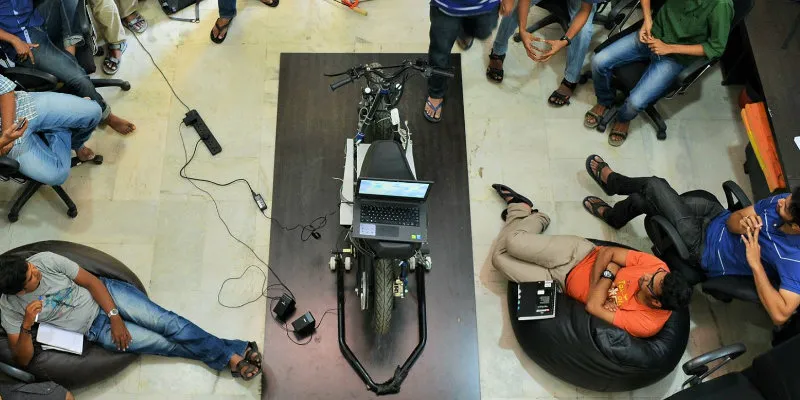The story behind India's first smart electric scooter
Most entrepreneurs today are reluctant to look beyond the much-hyped e-commerce world. Billion-dollar valuations and the heavy inflow of funds have put innovation on the backburner. However, there are some startups that still venture into capital-intensive sectors like manufacturing. It was the desire to startup that led IIT Madras alumni Tarun Mehta and Swapnil Jain to return to their alma mater to work on developing a Lithium-ion battery pack.

The duo launched Ather Energy in 2013, a startup focused on designing high-speed, electric two-wheelers for the Indian market. For the past two years, they have been working on their first product, a smart electric two-wheeler – the Ather S340.
Tarun says,
During my graduation, I frequently interacted with electric scooter owners. Most of them expressed concerns over negligible power, lack of service support, and poor battery life.”
An initial survey gave the duo insight into how consumers are excited about an electric scooter that is on par in terms with petrol scooters in terms of performance.
Ather-S340
The Ather-S340 is a connected vehicle powered by lithium-Ion battery pack, and features a digital touchscreen dashboard, a light-weight aluminum chassis, and can reach speeds of 75 kmph. The smart dashboard in the vehicle will enable users to create personalised profiles, choose riding modes and set other ride preferences. The vehicle charges upto 90 per cent in less than an hour. Its touchscreen dashboard contains a Vehicle Control Unit (diagnostic system) that constantly monitors the rider’s behavior, a GPS, and an indicator showing how much distance can be travelled on the remaining charge. The personalised profile feature will allow users to create their profile comprising all the basic information.

Funding phase
Ather Energy was lucky enough to win its first set of orders at the prototype stage, which worked as a catalyst to raise funds. In 2014, it received Rs 45 lakh from the Technology Development Board under Department of Science and Technology, IIT Madras, and Srini V Srinivasan, IIT alumnus and founder of Aerospike.
In the second half of 2014, the startup was again running short of funds as it was in its testing phase. Tarun says that investors weren’t willing to take a risk on the idea of building a smart electric scooter for the Indian market.
Post a lot of rejection, both Tarun and Swapnil approached the founders of Flipkart - Sachin Bansal and Binny Bansal -who believed in the idea and invested $1 million in Ather Energy in December 2014. This funding round also saw the participation of Raju Venkatraman, serial entrepreneur and CEO of MEDALL.
In May 2015, the startup scooped up a fund of $12 million from Tiger Global. The new round of funding has been used for development, testing, production and the launch of the Ather S340.
Swapnil says,
The majority of our resources are allocated for design and development. Our intention is not just to build a better electric vehicle, but to offer a better two-wheeler. Apart from the battery pack, we have also designed and developed key sub-systems like the fast charger, BMS and a touchscreen dashboard.”
Swapnil looks after system design and development. As an essential part of the Formula SAE (Society of Automotive Engineers) team of IIT-M, he has led various product development projects.
Manufacturing base
Ather Energy is in the process of opening up its first manufacturing plant in Whitefield. Additionally, it has its design centre in Victoria Road. Since 2013, the team of Ather Energy has expanded from 10 to 90. The product development team has 70 members, while the remaining 20 are in sales and support services, HR, finance and business operations.
We are currently in the final prototype stage. The fully integrated vehicle is currently under testing and validation, following which we will proceed for statutory approvals. Significant electronics integration and testing will be our focus area in 2016. Our procurement team is already working with the appropriate partners to ensure that we source quality components,” says Tarun.

Rollback of electric vehicles in India
Though Government of India has announced “National Electric Mobility Mission Plan (NEMMP) 2020” in 2013, the delay in implementing the same has reduced the number of electric two-wheeler manufacturers from 28 in 2011-12 to seven in 2014-15, according to a report by National Institute of Urban Affairs.
Moreover, the number of electric vehicles sold in 2014-15 declined (84%) from 100,000 in 2011-12 to 16,000 in 2014-15. Infrastructure and market development cost for electric vehicles, especially hybrids is estimated at Rs. 23,000 over the eight years.
However, with the government targeting 100 GW of solar by 2022, and an ambitious plan to put seven million electric and hybrid vehicles on the road each year by 2020, the industry is likely to gain pace.
A glimpse at the global market
Historically, the first patent application for an electric bicycle was filed in 1895 in Ohio. And in 1919, Ransomes, Sims & Jefferies pioneered the prototype for an electric motorcycle in England. The first electric motorcycle company called Socovel was founded in 1936 in Brussels.
Globally, several companies have released electric vehicles into the market. These include Brammo, Zero Motorcycles, BMW, Electric Motorsport, Hollywood Electrics, Yamaha, Harley-Davidson and Lito. Japanese Terra Motors started selling electric scooters in India in 2015 and announced that they were building a $5 million plant in Gurgaon. At the Consumer Electronic Show 2015, Gogoro announced the Gogoro Smartscooter and Gogoro Energy Network, a battery-swapping network.
Yourstory’s take
Though the electric vehicles industry is yet to gain momentum, six states across India including Delhi-NCR, Bihar, West Bengal and Orissa have witnessed the operation of 250,000 e-rickshaws. With the proliferation of toxic pollution, the adoption of electric vehicles is likely to be amplified across cities in India. An IIM-A report says that the low-carbon scenario with ‘highest’ EV penetration shows a 50 per cent drop in PM 2.5 by 2035.
Other positive trends in India include the launch of the Mahindra E20, India’s first electric vehicle, priced at Rs. 4.79 lakh. The Gujarat-based Yo Bykes has pioneered the electric scooter in India. Others include Hero RNT Diesel Hybrid Scooter, Hero Splendor iSmart, Hero Leap, Mahindra GenZe, TVS Qube and Hyosung ST-E3 EVA.
Coimbatore-based electric vehicle startup Ampere Electric has developed electric cycles, electric two wheelers and e-scooters. The company also claims to be the first one to make their own chargers (36V and 48V) for e-vehicles.
Ather Energy claims that unlike other players, its S340 offers a connected ride experience, features on-board navigation, personalised profiles, a top speed of 72 kmph and sub-one-hour charging.
Already backed by IIT Madras, Flipkart founders, Tiger Global, Ather Energy is set to invest Rs 25 crores by 2016 to kickstart the manufacturing of the S340. Though the company claims that S340 will be the first electric scooter to be completely designed and manufactured in India, only time will tell if their vision will reach fruition.







